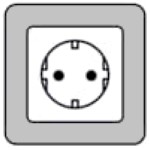Plug For Iran: What You Need To Know
What is the plug for Iran? Before you travel, check the information below to make sure your electronic devices are compatible with the outlet type and voltage.
Electrical Summary
Plug Compatibility: Type C, Type F
Voltage: 220V – 240V
Frequency: 50 Hz
Type C

Type F

Can North Americans use Electronics in Iran without an Adapter?
No! North Americans will need an adapter for the outlets and a transformer for the voltage when traveling to Iran. North Americans device plugs will not work with the outlet types in Iran. Also, the voltage in Iran is different from North American voltages.
Can Europeans use Electronics in Iran without an adapter?
Yes! Europeans do not need a travel adapter or transformer when traveling to Iran. Most device plugs will work with the outlet types in Iran. Also, the voltage in Iran is the same as in Europe.
What Outlet does Iran Use?
Type C

Type C plug sockets are used in Europe, Africa and Asia. They have two round pins and no grounding pin. These plugs are typically used with devices that have a voltage of 220-240V. This outlet is rated for 2.5 amps. Plug Type E, and Type F are compatible with this socket. All other plug types will need an adapter.
Type F

Type F electrical plug sockets are used in Germany, Spain, Italy and some parts of Africa. They have two round pins and a grounding pin. These outlets are typically used with devices that have a voltage of 220-240V. This outlet is rated for 16 amps. Plug Type C and Type E are compatible with this socket. All other plug types will need an adapter.
Is it safe to drink water in Iran?
The safety of drinking water in Iran can vary depending on the location and source of the water. In general, the tap water in Iran is not considered safe to drink, especially in rural areas and smaller towns. The water quality may be poor due to inadequate treatment facilities and inadequate sanitation practices.
According to the World Health Organization (WHO), about 93% of the population in Iran has access to improved drinking water sources, which means that the water is from a protected well or spring, or treated through a piped system. However, even with improved sources, the water quality may not be consistently safe to drink.
If you are in Iran, it is recommended to drink only bottled water, which is widely available and affordable. It is essential to ensure that the seal is intact before consuming the bottled water.
Additionally, it is advisable to avoid using tap water for brushing teeth or rinsing mouth, as well as for washing food or cooking. It is also recommended to avoid drinks that contain ice, as the ice may have been made with tap water.
If you are traveling to Iran, it is recommended to consult with a healthcare provider or a travel health specialist for specific recommendations on how to stay healthy and avoid waterborne diseases.
We recommend always packing a filtered water bottle when traveling:
Travel Essentials
Be sure to check our list of travel essentials before your trip!
Should I get travel insurance when traveling to Iran?
It is generally recommended to get travel insurance when traveling to a different country. Travel insurance can provide financial protection and peace of mind in case of unexpected events, such as medical emergencies, trip cancellations, lost or stolen baggage, or other travel-related mishaps.
Travel insurance can cover various expenses related to your trip, such as medical expenses, emergency medical transportation, trip cancellation or interruption, lost or stolen baggage or personal belongings, and other travel-related expenses.
Before purchasing travel insurance, it’s important to carefully review the policy details, including the coverage limits, exclusions, and any applicable deductibles or copays. You should also make sure that the policy covers any activities or destinations that you plan to participate in or visit during your trip.
Travel Summary
Iran is also home to many UNESCO World Heritage sites, including the ancient city of Persepolis, the beautiful Persian gardens of Shiraz, and the historic bazaar of Tabriz. Visitors can explore stunning mosques and palaces, such as the Nasir al-Mulk Mosque and the Golestan Palace, as well as the beautiful natural landscapes of the country’s many parks and mountains.
Iran is also known for its delicious cuisine, with a range of traditional dishes such as kebabs, stews, and rice dishes, as well as a thriving modern food scene. The country’s tea culture is also an important part of daily life and visitors can enjoy a cup of chai with locals in many cafes and restaurants.
Iran is a destination for travelers with a strong sense of hospitality and a rich cultural heritage. The official language is Persian, but many people speak English as well. The country has a well-developed tourism infrastructure, with a range of accommodations and activities to suit all budgets and interests.
Overall, Iran is a must-visit destination for anyone interested in history, culture, and architecture. With its stunning monuments, delicious food, and welcoming locals, Iran offers a unique and unforgettable travel experience.
Traveling to another country? Check out our Countries page for more info.